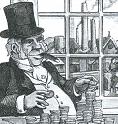|
China is our second largest trader after the US. Granted, we sell five times as much stuff to the Yankees as we do to the Chinese, but they are hardly irrelevant in this calculation and a slowdown in China, which seems to be on its way, won't be good news us.
|
|
|
|

|
| # ? May 1, 2024 02:58 |
|
US is currently our largest export destination but the trends are that US consumption and Chinese consumption is increasing so it's possible and quite likely that their positions will switch over the next decade . That's why the CPC government is so gung-ho (hah) on the Chinese.
|
|
|
|
Over the next decade? That seems a bit premature. We export something like 11% of our poo poo to China and around 50% to the USA, which makes a lot of sense given history and geography. I'm sure China's relative share will grow but it'd be pretty shocking if they overtook the USA as our primary trade partner in the next ten years.
|
|
|
|
Helsing posted:Another big question mark here is just how much exposure the bank's have to a housing bust. One of the big things stopping me from switching my savings out of the TD and into a credit union, such as VanCity, is the horrifying level of exposure they have. VanCity in particular has its name plastered on so many condo developments that I am almost certain it will be entirely bankrupt in the event of a housing collapse.
|
|
|
|
Rime posted:One of the big things stopping me from switching my savings out of the TD and into a credit union, such as VanCity, is the horrifying level of exposure they have. VanCity in particular has its name plastered on so many condo developments that I am almost certain it will be entirely bankrupt in the event of a housing collapse. So does Canada at least have insurance for bank deposits similar to the US FDIC?
|
|
|
|
etalian posted:So does Canada at least have insurance for bank deposits similar to the US FDIC? CDIC covers 100 K in checking/savings and GIC's
|
|
|
|
Whiteycar posted:CDIC covers 100 K in checking/savings and GIC's Not for credit unions. They are covered by the provincial deposit insurance... to which I can only remark: "lots of luck...".
|
|
|
|
Helsing posted:Its Harper, not Cameron, and unlike the real David Cameron our Stephen Harper has been more than willing to use economic stimulus when things go south. However you're completely correct that our economy is entirely reliant on a mixture of debt financed consumer spending that is being powered by the housing bubble and China's insatiable hunger for our raw resources. If we have a housing crash (or even a "soft landing") and a slowdown in China happening simultaneously things will get very nasty for us. Yes sorry that was a mistake, but I am not sure Harper is going to be willing to institute the type of fiscal stimulus needed in such an event even if he is a bit softer historically on the austerity line. The issue is whether he as a fundamentally center-right politician be willing to put needed stimulus in the economy when the Canadian government may be hit by a wave of claims? Would a liberal or NDP government? coalition be willing to? Canada controls its currency and its debt levels are relatively stable, but looking at the amount of household debt Canada has and the possibility of being hit by a loss of exports there is the very real possibility of deflation. Even if you are talking about only 11% of exports that is still considerable especially if US demand remains tepid and Canada products may face reduced demand beyond US/China. Ardennes fucked around with this message at 08:13 on Feb 2, 2014 |
|
|
|
Make no mistake, there's nothing centre right about Harper. He used to be in charge of the National Citizens Coalition, which is basically the Canadian equivalent of the Heritage Foundation. He's a hardcore right winger who just happens to understand that his long term plans for transforming the Canadian federal government require a lot of gradualism and tactical finesse. However in 2008 when Harper was running a recently re-elected minority government and was worried that he might lose a vote of no confidence to the combined forces of the opposition parties he was willing to ignore his own principles and enact a major stimulus program because he calculated that it was the right move to make politically. The point here being that Harper, assuming he's still in office when the poo poo hits the fan, will do whatever he calculates would be best for the Conservative party. Like I said, if the Conservatives have managed to win another majority government before the crisis hits then they will probably use any crisis that emerges as an opportunity to make even deeper cuts, much like David Cameron did in the UK. But if the Conservatives only win a minority (and assuming the NDP and Liberals aren't willing to combine forces to oust him in such a situation) or if the crisis hits before the election, then it becomes much harder to say exactly what Harper would do. His main priority is staying in power so if he thought stimulus spending would help his party's chances then he'd definitely turn on the taps. The NDP and/or Liberals would likely be willing to spend some money on stimulus but almost certainly they would never be willing to spend enough money to actually compensate for the loss of income. Probably the best Canada could hope for would be an Obama 2008 style stimulus package that lessens the full blow of the crash without avoiding many years of economic pain. Given that we already are experiencing tepid growth and high unemployment that is not an encouraging prospect. The whole situation is a bit hard to predict because at the moment Canada, which has historically been a 2 or 2.5 party system effectively has three viable political parties. The Conservatives are in government, the NDP is down in the polls but still is the official opposition and the Liberals are up in the polls but currently in third place. The result is that its a very open question how the next election will play out, and therefore its hard to know what the exact configuration of political forces will be in the event of an economic meltdown.
|
|
|
|
Helsing posted:Make no mistake, there's nothing centre right about Harper. He used to be in charge of the National Citizens Coalition, which is basically the Canadian equivalent of the Heritage Foundation. He's a hardcore right winger who just happens to understand that his long term plans for transforming the Canadian federal government require a lot of gradualism and tactical finesse. He is right-wing for Canada, but if anything the world has moved with his views. The question is if he (Harper) is going to be willing to make any real impact in stimulus, or would trade any stimulus for "targeted cuts." He wants to stay in power, but looking at every other country in the world which has face similar, especially with the right-wing in power, they all have eventually succumbed to austerity and "labor reforms." In addition, real question of how much of a hit he will accept to the Canadian dollar which already is dropping along with the emerging markets. Obviously one plan is just to go back to the 1990s and use a weak Canadian dollar to attract American importing. However, there is the obvious issues of lower global and American demand. There is ultimately a narrow channel of possibilities since all three parties are more or less openly neo-liberal at this point including the NDP and will likely follow a fairly safe road versus the Washington consensus, looking at the EU including France and the rest of the developed world, it isn't looking too bright. Ardennes fucked around with this message at 09:10 on Feb 2, 2014 |
|
|
|
Whiteycar posted:CDIC covers 100 K in checking/savings and GIC's Per institution... So if you had 3 accounts at a total of 2 banks you'd be covered to the tune of $200,000 total. E: gently caress you, phone Kalenn Istarion fucked around with this message at 09:19 on Feb 2, 2014 |
|
|
|
It's entirely possible I got this from this thread. But anyway, I've been clearing out my Instapper queue and came across this academic paper: http://papers.ssrn.com/sol3/papers.cfm?abstract_id=2380431#%23 quote:When Real Estate is the Only Game in Town That describes Vancouver perfectly, almost eerily so! And wasn't particularly written with that city in mind as far as I can tell - the authors are from universities in Singapore, Princeton, Syracuse and Amherst.
|
|
|
|
etalian posted:Due to easy credit and unaffordable housing cost Canadians exceeded the worst of the US bubble in terms of debt loading Thanks Etalian. OP updated.
|
|
|
|
From Ben Rabidoux: http://www.ratespy.com/2-99-is-baaaaaack/ 2.99% 5 year mortgages are back. Wrap it up rentailures
|
|
|
|
Paul Boesnich is a realtor who's known for posting stats on the vancouver market. http://vancouvercondo.info/2014/01/friday-free-for-all-231.html#comment-220957 quote:New Listings 221 loving hell
|
|
|
|
Haha, 3% fixes at 95% LTV with amortization periods of 30 years+. Sounds like you got yourselves some real creditworthy borrowers out there.
|
|
|
|
Cultural Imperial posted:Paul Boesnich is a realtor who's known for posting stats on the vancouver market. lol  Basically the only comparable place in the USA in terms of having to fork over piles of money for a ancient rancher house is in Palo Alto, CA due to big infusion of new money from the startup boom. http://www.zillow.com/palo-alto-ca/
|
|
|
|
Random thought: is there any chance that the recent fall in the Canadian dollar has anything to do with foreign investors pulling out of the Canadian real estate market?
|
|
|
|
Whiskey Sours posted:Random thought: is there any chance that the recent fall in the Canadian dollar has anything to do with foreign investors pulling out of the Canadian real estate market? It's more driven by Canada's friendly next door neighbor with things such as the Fed QE program starting to slowly scale down in 2014, Canadian bank fiscal policy but also there's already been a big investor flight back to the USA safe harbor when you look at thing such as ETF stats. So pretty much multiple factors knocking the loonie rate down. 
etalian fucked around with this message at 19:03 on Feb 2, 2014 |
|
|
|
Whiskey Sours posted:Random thought: is there any chance that the recent fall in the Canadian dollar has anything to do with foreign investors pulling out of the Canadian real estate market? What makes you think foreigners are selling their RE holdings? I don't think the fall in the CAD vs the USD hasn't got anything to do with anything other than forex shitheads speculating that the great recession is over.
|
|
|
|
Cultural Imperial posted:What makes you think foreigners are selling their RE holdings? Just baseless speculation on my part. If I were a big foreign investor looking at the Canadian real estate market, I'd be shorting the hell out of it. Obviously that wouldn't account for the entire change in the CAD/USD exchange rate, I'm just curious if there are any other indicators of foreign capital pulling out of Canadian RE.
|
|
|
|
Whiskey Sours posted:Just baseless speculation on my part. If I were a big foreign investor looking at the Canadian real estate market, I'd be shorting the hell out of it. Obviously that wouldn't account for the entire change in the CAD/USD exchange rate, I'm just curious if there are any other indicators of foreign capital pulling out of Canadian RE. I haven't really seen any indications of this from the ~twitterverse~ but it's definitely something we should all pay attention to. The fun part about pulling out of real estate in event of a crash is that RE is extremely illiquid. I don't think you'll see money being pulled out as much as a huge accumulations in unsold housing stock. This is something we're seeing in Ottawa and Montreal, two markets which aren't really known as magnets for hot asian money. What we're also not seeing in Ottawa or Montreal are price reductions.
|
|
|
|
On a side note this is a pretty good book on macro bubble behavior by Robert Shiller: http://www.amazon.com/Irrational-Exuberance-Robert-J-Shiller/dp/0767923634 He also considers housing to be a dubious investment: quote:Trish Regan: "Then why buy a home? People trap their savings in a home. They're running an opportunity cost of not having that money liquid to earn a better return in the market. Why do it?"
|
|
|
|
That's a dumb analogy, people don't look at a 20 year old house in the city the same way they do a 94 honda civic or whatever. That maybe applies to the very richest people buying houses who just have to have trendy homes. It's a good book though and I agree with the general idea that houses are bad investments, but not because people won't want to buy them in the future.
|
|
|
|
Starks posted:That's a dumb analogy, people don't look at a 20 year old house in the city the same way they do a 94 honda civic or whatever. That maybe applies to the very richest people buying houses who just have to have trendy homes. It's a good book though and I agree with the general idea that houses are bad investments, but not because people won't want to buy them in the future. Condos are a lot more like cars than they are like single family homes, in my opinion.
|
|
|
|
Aren't houses theoretically valuable in future because of land scarcity? It sure as hell ain't for the shag carpet and Formica counters.
|
|
|
|
Lexicon posted:Aren't houses theoretically valuable in future because of land scarcity? It sure as hell ain't for the shag carpet and Formica counters. And in a case of a condo corporation theoretically liquidating to sell the land, you'd have a lot of costs associated with the teardown process etc. (nevermind the legal nightmare and associated costs), meaning that you're getting 'scrap value' more akin to a beater car than you are land value from a single lot.
|
|
|
|
Starks posted:That's a dumb analogy, people don't look at a 20 year old house in the city the same way they do a 94 honda civic or whatever. That maybe applies to the very richest people buying houses who just have to have trendy homes. It's a good book though and I agree with the general idea that houses are bad investments, but not because people won't want to buy them in the future. -said no one in detroit people are trading houses like they're trading bitcoins in vancouver  I think it's completely fair to look at houses like cars with 100 year lifespans.
|
|
|
|
There's definite upgrade and renovation expenses associated with older housing. It's not trivial. Even if you're just talking about appliances and utilities.
|
|
|
|
Cultural Imperial posted:I think it's completely fair to look at houses like cars with 100 year lifespans. LemonDrizzle fucked around with this message at 22:36 on Feb 2, 2014 |
|
|
|
LemonDrizzle posted:Come on, now you're being silly. If this were universally true, I should be able to pick up a Manhattan brownstone for $100 and still have change for a nice central London mews house. Houses clearly do require maintenance and can depreciate over time, but they can also appreciate significantly or retain their original real-terms value. LIke a Ferrari 250 GTO or a Tucker or a split window Corvette Stingray? Yes. Obviously there are outliers but maybe you should talk to the dumbasses in north vancouver living in wooden condos built in the 60s that need to be demolished.
|
|
|
|
Real estate does have some value as an investment, but it is very circumstantial. Ultimately, even cheap condos in Vancouver might appreciate on their own, but it would likely have been very modest over a long period of time. One issue is that in general the middle class in many developed and even developing countries are looking for a place to put their wealth (such as it is). Equities were once a more common place to put then 2008 happened, and bonds can be tricky and lower yield than many can accept. Then you have the gold and other commodity speculation which is also risky. You can carry cash but risk losing from monetary and price inflation, so the middle class gets diverted into real estate which as has shown been very risky on its own.
|
|
|
|
Ardennes posted:Real estate does have some value as an investment, but it is very circumstantial. Ultimately, even cheap condos in Vancouver might appreciate on their own, but it would likely have been very modest over a long period of time. The whole get a investment mindset is amusing since for areas like Vancouver you are buying a property near the top of the bubble. Good investments are all about buying low and selling high in the future. Also the concept of being a investment for real estate is dubious since any house will have a list of yearly costs, while at least a stock will get you a dividend yield.
|
|
|
|
etalian posted:The whole get a investment mindset is amusing since for areas like Vancouver you are buying a property near the top of the bubble. Just to be clear I am not defending the bubble (or any bubble really), and people investing in Vancouver real estate are just making a clear bad bet. I wouldn't want to seem cruel and use the term "sucker" but you know what I mean. There is a calculus to real estate especially if you are in an area where housing prices and rent aren't that far apart. People have made money off of their houses over time, and it wasn't imaginary but that is in a more normal market, for example I don't think buying a house in Portland is that bad of an investment. That said, different countries and different circumstances. However, I think the larger point holds true that many middle class people are looking for a place to put money and it is becoming more difficult. (In addition, real estate traditionally is actually more safe than equities but it obviously comes at a price.)
|
|
|
|
The idea that housing being built right now is way better than housing built 100 years ago might be true in some places but its hardly some kind of universal truism that can be invoked to demonstrate why housing is a bad investment. That's a really ridiculous statement to make. Ardennes posted:He is right-wing for Canada, but if anything the world has moved with his views. Harper would be pretty ring wing by the standards of any English speaking country. His actions are constrained by the political context he's in but he's a fairly hardline Hayekian conservative who doesn't believe in climate change. He's definitely ahead of the ring wing global curve. quote:The question is if he (Harper) is going to be willing to make any real impact in stimulus, or would trade any stimulus for "targeted cuts." He wants to stay in power, but looking at every other country in the world which has face similar, especially with the right-wing in power, they all have eventually succumbed to austerity and "labor reforms." In addition, real question of how much of a hit he will accept to the Canadian dollar which already is dropping along with the emerging markets. Canada has been getting pretty substantial austerity and some mild labour reforms for the last several years. Like I said, the question of whether the government would respond to a housing crash with stimulus spending or further austerity will heavily depend on the timing. quote:Obviously one plan is just to go back to the 1990s and use a weak Canadian dollar to attract American importing. However, there is the obvious issues of lower global and American demand. Neoliberalism and stimulus spending aren't always mutually incompatible, neoliberalism will just have a big impact on what kind of stimulus spending is permissible. As far as looking for global precedents I think that's a dangerous game. You can't really compare Canada's current position with that of an EU country or even with that of the USA in 2008. I mean you're definitely right that we're not about to see some kind of sweeping New Deal legislation or the government employing public works projects to put the country back to work, but I also don't think we can just pre-emptively say "Canada will just pull a Britain and slash its public sector".
|
|
|
|
Another naysayer to everything is fine message http://www.theglobeandmail.com/report-on-business/bank-ceos-should-be-worried-about-real-estate-tds-clark/article16330596/
|
|
|
|
Helsing posted:Canada has been getting pretty substantial austerity and some mild labour reforms for the last several years. Like I said, the question of whether the government would respond to a housing crash with stimulus spending or further austerity will heavily depend on the timing. It wouldn't really even need to do that, the type of household debt Canada (and potentially governmental debt) is facing and overall global circumstances could put under a considerable amount of pressure on the country even if there is technically stimulus. It is ultimately difficult to predict, but I think you need to be more open to the idea that the Canadian political system may not be able to readily address the situation Canada is in and that its response may be more in align with the rest of the developed world than you hope. Canada overall wasn't hit as hard as many other countries during the 08 crisis, the coming crisis if anything is going to be a real test of the Canadian political system. I remain pessimistic. As an outsider, I have seen Canada follow much of the same footsteps as the rest of the developed world before they fell into deeper crisis.
|
|
|
|
Oh yeah we definitely aren't ready and our system certainly isn't equipped to deal with the fallout, I hope I'm not coming off as suggesting otherwise. I'm just saying that the response of the government is going to hinge quite a bit on electoral calculations (and therefore on the timing of the crash and the particular balance of forces in Ottawa when it happens). Even assuming we get some kind of stimulus its inconceivable that it will be large enough to actually replace the demand generating by the housing bubble, and even with that source of demand we already have an unemployment rate of 7.2%. A fall in real estate prices is going to result in very real economic pain, that isn't really in dispute here.
|
|
|
|
Helsing posted:Oh yeah we definitely aren't ready and our system certainly isn't equipped to deal with the fallout, I hope I'm not coming off as suggesting otherwise. I'm just saying that the response of the government is going to hinge quite a bit on electoral calculations (and therefore on the timing of the crash and the particular balance of forces in Ottawa when it happens). Even assuming we get some kind of stimulus its inconceivable that it will be large enough to actually replace the demand generating by the housing bubble, and even with that source of demand we already have an unemployment rate of 7.2%. In that sense I agree, stimulus is more likely before the election than after it. For the sake of argument, lets say it happens this year and Harper provides mild stimulus in order to keep Canada from free fall, but loses the election anyway. Would a liberal/ndp coalition government be at risk of being long on rhetoric and short on actual change? I could see them keeping Harper's stimulus but I think the case scenario is fairly limited intervention beyond monetary stimulus. Canada would be caught in likely a prolonged malaise, that may be worse than the 2008 recession was for the US. As you said, the US was actually unexpectedly aggressive at least in 2009/2010 so Harper would have to at least meet that with possibility more considerable headwinds.
|
|
|
|

|
| # ? May 1, 2024 02:58 |
|
Honestly at this point a liberal / NDP coalition government seems very far fetched. The NDP would very much like to replace the Liberals as the centre left option and the Liberals are desperate to re-establish their status as the natural governing party. In the event that they win a plurality of the seats its a very big question mark as to what will happen next, and it will especially depend on who won more seats and just how heated things got during the election. The future of Canadian politics would already be very hard to forecast even if it didn't look like we were on the edge of a major economic downturn. The fact we may be approaching an Ireland style real estate collapse is not promising. I do think, however, that both the Liberals and NDP would probably be inclined to do something to "take action" if there were a big downturn so we'd get at least some increased government activism I imagine, though what form it would take is hard to say.
|
|
|
























